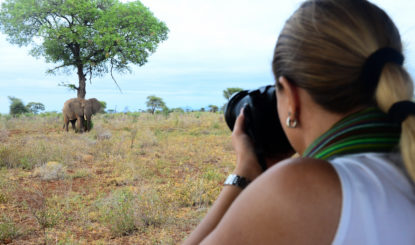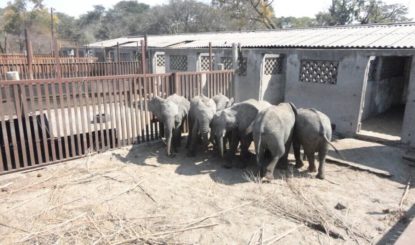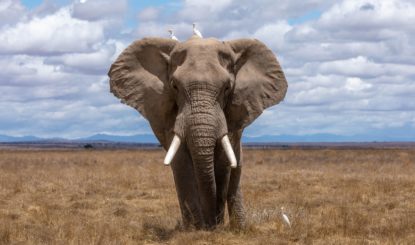Press Release: Botswana backtracks on elefant protection
Botswana, long been a safe haven for African elephants, has just announced that the ban on elephant hunting has been lifted. The president revoked a five-year ban on trophy hunting, which had been effective in allowing elephant populations to recover. For over 30 years, Fondation Franz Weber (FFW) has been working to protect elephants within the framework of the Convention on International Trade in Endangered Species of Wild Fauna and Flora (CITES). The foundation is deeply concerned about the change of heart by the government of Botswana.
Botswana has decided to re-open elephant trophy hunting. This complete turnaround in policy was announced at a multinational elephant summit last month, which was led by the president of Botswana, Mokweetsi Masisi. And it is not only trophy hunting. Like South Africa, Namibia, and Zimbabwe, Botswana intends to reopen the international ivory trade. This decision would be a complete disaster for the species. The African Elephant Coalition (AEC), an alliance of 32 African countries representing the vast majority of the elephant range, is strongly opposed to such a move. Instead, it is calling for the complete closure of the global ivory trade.
In 2008, ivory sales to China and Japan that had been authorised by CITES, led to a massive increase in poaching. Trade has not been a solution to combating the decline of elephants. In fact, it has been quite the opposite. Yet despite this, Botswana has submitted a proposal to reopen the ivory trade at the next Conference of the Parties to CITES (CoP18), which will be held in Geneva this August.
Botswana has attempted to justify its position by arguing that there is an “explosion” in its elephant population, which supposedly has caused an increase in human-elephant conflict. However, according to Ross Harvey, an independent economist, “the number of elephants declined by 15% in the last 10 years. Misuse was frequent, and the communities did not benefit from any profit from the hunting”. Hunting also heightens human-elephant conflict, as it makes the animals more aggressive.
It seems that the new policy is governed by other motives by the Botswana president. These include undermining his predecessor, Ian Khama, who was committed to protecting wildlife; and to obtain votes from rural communities for his political party with a view to the elections this October. Shannon Ebrahim, foreign editor of the periodical South Africa’s Independent Online, strongly condemns the motives, explaining that “the motivation of the president of Botswana is clearly to win votes during the October election, because the battle with the opposition will be harsh”.
Conservation circles see the decision by Botswana as a huge backward step. This is even more worrying since Botswana hosts a third of all African elephants. Until now, it was considered as the last safe haven for elephants. Fondation Franz Weber, an official CITES observer for over 30 years, is deeply concerned. According to FFW President Vera Weber: “Botswana does not realise what it is doing, and on top of that, it’s doing this for strictly political reasons. The country is playing with fire: if the CoP accepts this proposal, it could mean the death blow for African elephants throughout the continent. “
A recent study in 2018 conducted by Elephants Without Borders found that the elephant population of Botswana did not increase, contrary to what the government claims. According to Ross Harvey, “if the country is not careful, poaching could become the rule. Like in Tanzania, which has just lost 60% of its elephant population in the last five years”.
Losses of crops, property and human life present huge challenges to rural communities sharing elephant habitats. However, there are more factors at play, and more potential solutions, than simply killing elephants for dubious reasons. Conflict needs to be mitigated, for example through a combination of bee-hives, chilli and “smart” electric fences and safe migratory corridors. Coexistence should be strengthened by empowering communities, not through creating market demand for products from endangered species with an uncertain future.
Botswana is at serious risk of losing its conservation reputation. In view of the rising global sentiment against the consumptive use of wildlife products, President Masisi is tempting fate by abandoning precautionary conservation principles, which could lead to the collapse of their second largest economic sector, tourism, and threaten elephant populations everywhere.
Even worse, Botswana is not alone in adopting these controversial principles. Most governments in southern Africa intend to sell their ivory stockpiles to Japan or China. Zimbabwe is even threatening to withdraw from CITES if it does not get permission to do so!
At CoP18, there will be a stand-off between elephant protectionists and the countries – like Botswana – that want to profit from killing elephants. Fondation Franz Weber hopes that common sense will save the day, and is counting on the African Elephant Coalition (AEC), as well as on public opinion to help rescue Africa’s elephants from certain destruction.
“If people realised what is happening at CITES now, everyone would be outraged. It’s time for the representatives of the countries to align with public sentiment, which is for the survival of the species and not for their body parts”, says Weber.
More information
Fondation Franz Weber (FFW) is an official CITES observer. In August, the organization will be present at the Conference of the Parties to CITES (CoP18), a meeting of the decision-making body of CITES, which takes place every three years. FFW’s goal is straightforward: to ensure a complete ban on the global ivory trade. “Thirty years ago, almost to the day, in Lausanne, the CoP decided to put all elephants in Appendix I of CITES, which thus granted them the highest degree of international protection. There was then a period of just under 10 years, during which elephant populations gradually recovered. History must repeat itself again in Switzerland. The survival of the African elephant is at stake”, explains Vera Weber.
In August, FFW will also support a document jointly submitted by Switzerland, the EU, and the US on the international trade in ornamental fish. The goal is to obtain better data on this little-known trade that is not well regulated. The proposed in-depth investigation is an essential first step before we can obtain real international protection for marine wildlife.
Our projects
Stop the ivory trade
Stop the trade with baby elephants




